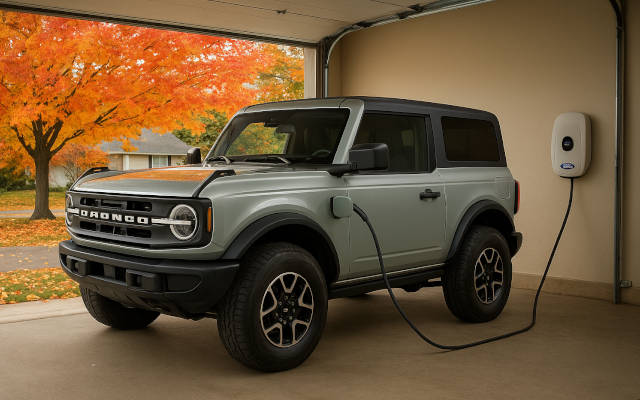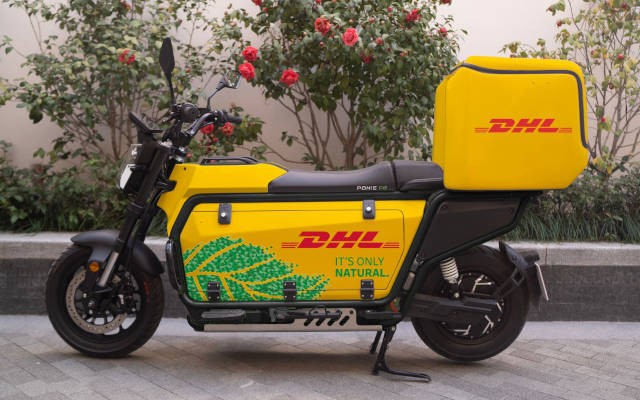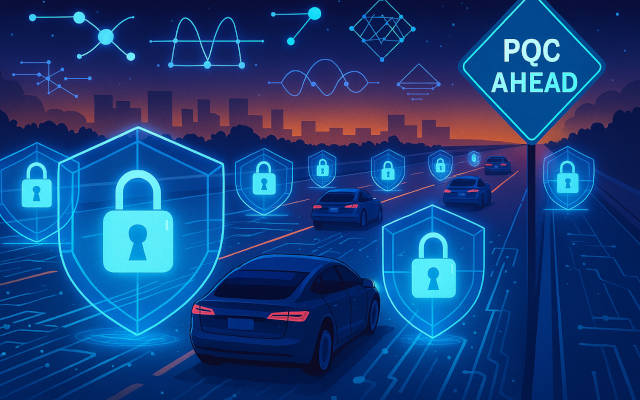 EDITOR'S PICK
EDITOR'S PICK
Ford Faces EV Crossroads as Federal Incentives Expire
02 Oct 2025 | Synopsis
 Ford CEO Jim Farley warns that U.S. EV sales could drop by half following the expiration of the $7,500 federal tax credit, citing high vehicle costs and reduced consumer demand. Ford is shifting focus to hybrids and more affordable EVs, while some dealers see the change as a chance to test market strength without subsidies. The industry faces uncertainty as it adapts to a post-incentive landscape.
Ford CEO Jim Farley warns that U.S. EV sales could drop by half following the expiration of the $7,500 federal tax credit, citing high vehicle costs and reduced consumer demand. Ford is shifting focus to hybrids and more affordable EVs, while some dealers see the change as a chance to test market strength without subsidies. The industry faces uncertainty as it adapts to a post-incentive landscape.The LNG Detour: What Scotland's New Ferry Teaches US
02 Oct 2025 | Synopsis
 Scotland's Glen Sannox ferry, launched as a “green” LNG-powered vessel, emits more greenhouse gases than its diesel predecessor due to underestimated methane slip. Despite improved local air quality, real-world data shows LNG's climate impact is worse over short timeframes. The project highlights how optimistic assumptions and delayed construction turned a sustainability effort into a cautionary tale about transitional fuels and lifecycle emissions.
Scotland's Glen Sannox ferry, launched as a “green” LNG-powered vessel, emits more greenhouse gases than its diesel predecessor due to underestimated methane slip. Despite improved local air quality, real-world data shows LNG's climate impact is worse over short timeframes. The project highlights how optimistic assumptions and delayed construction turned a sustainability effort into a cautionary tale about transitional fuels and lifecycle emissions.The Current War On Science, Who's Behind It And Why
02 Oct 2025 | Synopsis
 Science Under Siege asserts the undermining of science is not accidental but largely driven by ideological, economic, and political forces. It points fingers at special interests, political actors, and media amplifying doubt for gain. It also critiques how scientists themselves sometimes contribute by failing to communicate clearly or by letting funding and institutional pressures interfere with objectivity. The result: erosion of public trust, polarized discourse, and weakened science-based policy.
Science Under Siege asserts the undermining of science is not accidental but largely driven by ideological, economic, and political forces. It points fingers at special interests, political actors, and media amplifying doubt for gain. It also critiques how scientists themselves sometimes contribute by failing to communicate clearly or by letting funding and institutional pressures interfere with objectivity. The result: erosion of public trust, polarized discourse, and weakened science-based policy.PNY Electric Cargo Scooter Completes Successful Multi-Location Last-Mile Delivery Trials
01 Oct 2025 | Synopsis
 PNY's Ponie P2, the world's first electric cargo motorcycle, completed successful trials across Tel Aviv, Milan, and other urban locations with partners like DHL and postal services. Manufactured in Israel, the P2 features a top speed of 100 km/h, high payload capacity, modular cargo options, and a 160 km range. Compared to gas-powered delivery vehicles used by Wolt - a Finnish delivery platform - it offers lower fuel and maintenance costs, making it a cost-effective, zero-emission solution for last-mile logistics.
PNY's Ponie P2, the world's first electric cargo motorcycle, completed successful trials across Tel Aviv, Milan, and other urban locations with partners like DHL and postal services. Manufactured in Israel, the P2 features a top speed of 100 km/h, high payload capacity, modular cargo options, and a 160 km range. Compared to gas-powered delivery vehicles used by Wolt - a Finnish delivery platform - it offers lower fuel and maintenance costs, making it a cost-effective, zero-emission solution for last-mile logistics.Post-Quantum Security and the Electric Car: What Drivers Need to Know
01 Oct 2025 | Synopsis
 Post-quantum security protects electric vehicles from future quantum threats that could break current encryption. As EVs rely on secure software updates, telemetry, and identity systems, automakers are adopting quantum-resistant algorithms. With NIST's 2024 standards and cloud providers piloting migration, the shift is underway to safeguard long-lived vehicles and data. Drivers may not notice, but it's vital for safety and trust.
Post-quantum security protects electric vehicles from future quantum threats that could break current encryption. As EVs rely on secure software updates, telemetry, and identity systems, automakers are adopting quantum-resistant algorithms. With NIST's 2024 standards and cloud providers piloting migration, the shift is underway to safeguard long-lived vehicles and data. Drivers may not notice, but it's vital for safety and trust.
 EVWorld Exclusive
EVWorld Exclusive
Electric Icons in the Making: Audi Concept C vs. Chevrolet Corvette EV
23 Oct 2025 |  Audi's Concept C previews a refined electric GT built on the mature PPE platform, likely arriving by 2026. Chevrolet's Corvette EV promises supercar performance but faces packaging and thermal challenges. Audi is closer to production; Corvette remains in early development. Both reflect divergent strategies in electrifying legacy sports cars, with Audi emphasizing platform maturity and Chevrolet pursuing brand continuity through engineering innovation.
Audi's Concept C previews a refined electric GT built on the mature PPE platform, likely arriving by 2026. Chevrolet's Corvette EV promises supercar performance but faces packaging and thermal challenges. Audi is closer to production; Corvette remains in early development. Both reflect divergent strategies in electrifying legacy sports cars, with Audi emphasizing platform maturity and Chevrolet pursuing brand continuity through engineering innovation.
Electrification Is Not an Oversimplification
23 Oct 2025 |  Despite critiques that the quest for global electrification is "simplistic", the transition is strategic and necessary. Grid upgrades, battery innovation, and tailored policies make electrification viable. Sodium-ion batteries and recycling reduce material risk. Compared to fossil fuels, electrification offers cleaner, safer, and more resilient systems. Complexity demands better design - not delay.
Despite critiques that the quest for global electrification is "simplistic", the transition is strategic and necessary. Grid upgrades, battery innovation, and tailored policies make electrification viable. Sodium-ion batteries and recycling reduce material risk. Compared to fossil fuels, electrification offers cleaner, safer, and more resilient systems. Complexity demands better design - not delay.
What Is the Real Cost to Replace EV Tires?
23 Oct 2025 |  A recent BGR article overstates EV tire costs and ignores fuel savings, regenerative braking, and tire tech advances. Most EV drivers spend ~$2,100–$2,700 on tires over 100,000 miles - not $3,600. EVs save thousands in fuel and benefit from smoother wear profiles. Brands like Goodyear and Michelin now offer EV-specific tires with longer life and better efficiency. The article lacks context and deserves correction.
A recent BGR article overstates EV tire costs and ignores fuel savings, regenerative braking, and tire tech advances. Most EV drivers spend ~$2,100–$2,700 on tires over 100,000 miles - not $3,600. EVs save thousands in fuel and benefit from smoother wear profiles. Brands like Goodyear and Michelin now offer EV-specific tires with longer life and better efficiency. The article lacks context and deserves correction.
The Battery Divide: Strategic Choices in the Global Race to Electrify Mobility
23 Oct 2025 |  Toyota's "1 EV = 90 hybrids" logic reflects lithium scarcity, but sodium-ion batteries challenge that premise. Sodium offers low-cost, abundant chemistry for short-range EVs, decoupling electrification from lithium dependence. National policy shapes adoption: Europe favors full EVs, the U.S. subsidizes hybrids, and emerging markets seek pragmatic solutions. The battery divide is not just technical - it's strategic, reshaping the future of mobility.
Toyota's "1 EV = 90 hybrids" logic reflects lithium scarcity, but sodium-ion batteries challenge that premise. Sodium offers low-cost, abundant chemistry for short-range EVs, decoupling electrification from lithium dependence. National policy shapes adoption: Europe favors full EVs, the U.S. subsidizes hybrids, and emerging markets seek pragmatic solutions. The battery divide is not just technical - it's strategic, reshaping the future of mobility.
Irizar Expands Electric Bus Lineup with Global Reach and Long-Range Performance
22 Oct 2025 |  Irizar has launched two new electric buses - the ie bus and i3 Normal Floor - with over 450 km range, advanced safety systems, and modular lithium-ion batteries. The Spanish manufacturer has delivered over 1,000 electric buses globally since 2014. The new models are lighter, seat up to 53 passengers, and meet European safety and cybersecurity standards. With deployments in Europe, Latin America, and Oceania, Irizar is positioned as a global leader in zero-emission transit.
Irizar has launched two new electric buses - the ie bus and i3 Normal Floor - with over 450 km range, advanced safety systems, and modular lithium-ion batteries. The Spanish manufacturer has delivered over 1,000 electric buses globally since 2014. The new models are lighter, seat up to 53 passengers, and meet European safety and cybersecurity standards. With deployments in Europe, Latin America, and Oceania, Irizar is positioned as a global leader in zero-emission transit.
SEARCH RSSTREAM
 79 New Postings In Past 24 Hours
79 New Postings In Past 24 Hours
Category:finance
Region:NoAmerica
Date:23 Oct 2025
Category:mobility
Region:NoAmerica
Date:23 Oct 2025
Category:mobility
Region:NoAmerica
Date:23 Oct 2025
Category:mobility
Region:NoAmerica
Date:23 Oct 2025
Category:finance
Region:NoAmerica
Date:23 Oct 2025
Category:mobility
Region:NoAmerica
Date:23 Oct 2025
Category:energy
Region:AsiaPacific
Date:23 Oct 2025
Category:energy
Region:Global
Date:23 Oct 2025
Category:mobility
Region:NoAmerica
Date:23 Oct 2025
Category:energy
Region:NoAmerica
Date:23 Oct 2025
Category:mobility
Region:NoAmerica
Date:23 Oct 2025
Category:mobility
Region:NoAmerica
Date:23 Oct 2025
Category:energy
Region:Global
Date:23 Oct 2025
Category:mobility
Region:NoAmerica
Date:23 Oct 2025
Category:mobility
Region:IndoAsia
Date:23 Oct 2025
Category:mobility
Region:Europe
Date:23 Oct 2025
Category:mobility
Region:AsiaPacific
Date:23 Oct 2025
Category:mobility
Region:NoAmerica
Date:23 Oct 2025
Category:energy
Region:Europe
Date:23 Oct 2025
Category:mobility
Region:NoAmerica
Date:23 Oct 2025
